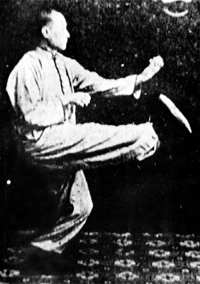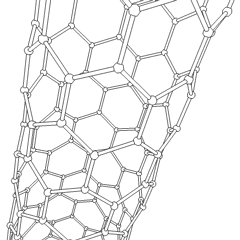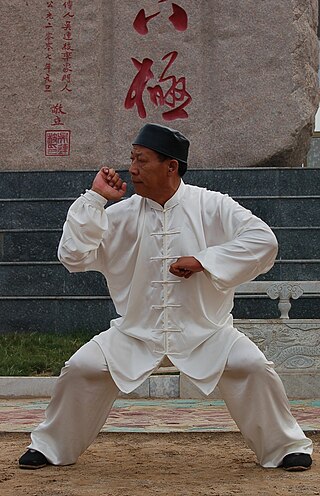Wu Qiang may refer to:
Wu Qiang may refer to:
The Five Barbarians, or Wu Hu, is a Chinese historical exonym for five ancient non-Han peoples who immigrated to northern China in the Eastern Han dynasty, and then overthrew the Western Jin dynasty and established their own kingdoms in the 4th–5th centuries. The peoples categorized as the Five Barbarians were:
Qin may refer to:

Emperor Wu of Jin, personal name Sima Yan, courtesy name Anshi (安世), was the grandson of Sima Yi, nephew of Sima Shi and son of Sima Zhao. He became the first emperor of the Jin dynasty after forcing Cao Huan, last emperor of the state of Cao Wei, to abdicate to him. He reigned from 266 to 290, and after conquering the state of Eastern Wu in 280, was the emperor of a reunified China. Emperor Wu was also known for his extravagance and sensuality, especially after the unification of China; legends boasted of his incredible potency among ten thousand concubines.

Eagle Claw is a style of Chinese martial arts known for its gripping techniques, system of joint locks, takedowns, and pressure point strikes, which is representative of Chinese grappling known as Chin Na. The style is normally attributed to the famous patriotic Song dynasty General Yue Fei. Popular legends states that he learned martial arts from a Shaolin Monk named Zhou Tong and later created Eagle Claw to help his armies combat the invading armies of the Jin dynasty. It was passed down until the Ming dynasty. Thus, the style took on long range strikes and aerial jumps. During the Qing dynasty, the military instructor Liu Shi Jun became known as the modern progenitor of Eagle Claw and taught many students. His student Liu Cheng You later taught Chen Zizheng who was invited to teach the style in the prestigious Chin Woo Athletic Association during the Republican era. The style spread as Chin Woo opened sister schools in other provinces. Today, it is practiced around the world.

A nanotube is a nanometer-scale hollow tube-like structure.

Bajiquan is a Chinese martial art that features explosive, short-range power and is famous for its elbow and shoulder strikes. Its full name is kaimen ba ji quan.

Jin is the Hanyu pinyin transliteration of a number of Chinese surnames. The most common one, Jīn 金, literally means "gold" and is 29th in the list of "Hundred Family Surnames". As of 2006, it is ranked the 64th most common Chinese surname and is sometimes transliterated as Chin.
The Disasters of the Partisan Prohibitions (黨錮之禍) refers to two incidents in which a number of Confucian scholars who served as officials in the Han imperial government and opposed to powerful eunuchs, and the university students in the capital Luoyang who supported them (collectively referred to by the eunuchs as "partisans", were imprisoned. Some were executed; some were released but lost their civil rights. The first incident was largely bloodless, but the second incident, which came after the Confucian scholars Dou Wu and Chen Fan were defeated by eunuchs in a physical confrontation, saw a large number of the partisans lose their lives. The restrictions on civil liberties imposed on the surviving partisans were not lifted until 184 when Emperor Ling was concerned that the partisans would join the Yellow Turban Rebellion.

Equijubus, is a genus of herbivorous hadrosauroid dinosaur from the Early Cretaceous of northwestern China.
Ke is a Chinese surname. It originally appeared on the Hundred Family Surnames. As of 2006 was no longer one of the top 100 most common surnames. A 2013 study found that it was the 145th most common surname, shared by 1.06 million people or 0.080% of the population, with the province most being Hubei. It is also spelled as Quah, Qua, Kua, Kuah, Kwa, Ke, Ker, Ko, Kok, Or or O in English.
Qiang may refer to:

The Water Margin is a 1998 Chinese television series adapted from Shi Nai'an's classical 14th-century novel of the same title. It was produced by CCTV with Zhang Jizhong as producer. It was first broadcast in China in January 1998. The series also featured action choreography by Yuen Woo-ping.

Qiang was a name given to various groups of people at different periods in ancient China. The Qiang people are generally thought to have been of Tibeto-Burman origin, though there are other theories.
Wang Qiang may refer to:

The Han Triumph, also known as Wind Ode, is a Chinese television series based on historical events in the early Han dynasty, beginning with the founding of the dynasty by Liu Bang after his triumph over Xiang Yu, and the events leading to the reign of Liu Heng. Directed by Huang Jianzhong, the series starred Ray Lui, Wang Ji, Liu Mu, Zhang Guangbei, Chen Wei and Li Qingxiang in the leading roles. It was first broadcast on CCTV-8 in China on 17 December 2011.
The 2015 Anning Open was a professional tennis tournament played on outdoor clay courts. It was the fourth edition for men and second edition for women of the tournament and part of the 2015 ATP Challenger Tour and the 2015 ITF Women's Circuit, offering a total of $50,000+H for men $75,000 women in prize money. It took place in Anning, China, on 27 April–3 May for men and 4–10 May 2015 for women.
Sky Ladder: The Art of Cai Guo-Qiang is a 2016 documentary film directed by Kevin Macdonald about the life and work of Cai Guo-Qiang known for his artwork with the help of gunpowder. The film was released by Netflix on October 14, 2016.

Huaiyang (淮陽國), was a kingdom/principality that existed intermittently during the Han dynasty. Its territories was located in modern eastern Henan and northwestern Anhui.
Wu Qiang is a Chinese rower.

The 20th Central Committee of the Chinese Communist Party (CCP) was elected by the 20th National Congress in October 2022, and will sit until the next National Congress is convened in 2027. It formally succeeded the 19th Central Committee.